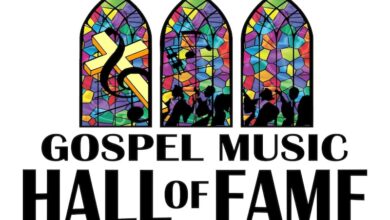The real reason we have another (terrible) God’s Not Dead movie

The movie “God’s Not Dead: We The People” is another very bad entry in a very bad franchise. But after watching the film and speaking to its star and producer David A.R. White, I realized the real problem with the franchise is that we don’t have a better alternative.
The “God’s Not Dead” franchise is a series that is as hated as it is successful. The first film,“God’s Not Dead,” released in 2014 and centered on a Christian college student battling his atheist professor who bullied him. It became one of the most profitable movies of all time, grossing $65 million at the box office on a $1.5 million budget. It went on to spawn two other sequels: “God’s Not Dead 2” in 2016 and “God’s Not Dead: A Light in the Darkness” in 2018.
Since the first movie came out, the franchise has become the poster boy for how White conservative Christians exaggerate the reality of Christian persecution in America and, intentionally or unintentionally, caricature and demonize their opposition.
The latest entry in the franchise, “God’s Not Dead: We The People” centers on the returning protagonist, the Rev. David Hill (David A.R. White), who reluctantly goes to Washington to try to persuade lawmakers not to vote for a bill that would force homeschooling families to conform to federal standards that don’t reflect their values.
I thought it made Christians look bad
As a lifelong Christian who was homeschooled and a film lover, I always strongly disliked the “God’s Not Dead” films — both for good and not-so-good reasons. I disliked it artistically — for the bad acting, the bad dialogue that was always more preaching than dialogue — and morally, for the way it misrepresented the people that it disagreed with. But I also disliked it because I thought it made Christians look bad, and I thought if I made a big show of how much I disliked it, I could show I was one of the “good Christians.”
That said, I was intrigued — and even hopeful — to watch this entry and have the opportunity to interview White, mainly for one reason: The previous entry in the franchise, “God’s Not Dead: A Light in the Darkness,” was a huge improvement artistically and morally on the rest of the series — and shockingly functioned as a meta-commentary admitting that the critics of the franchise up to that point were right.

The film centered on Reverend Hill working with his atheist brother to fight to keep his campus church on university grounds despite the wishes of the university. During the film, pastor Dave realizes that he has been unfairly demonizing his opponents and was exaggerating the level of persecution against him in a way that was tearing his community apart. He ended up apologizing to everyone and giving up his fight to save his church.
The makers of the “God’s Not Dead” films very explicitly said in the marketing that they made the film because they wanted to help move a divided country toward reconciliation. As White has been a huge part of shaping the franchise from the beginning, I hoped that — regardless of how the third movie fell short, in my opinion — he could shed some light on the thinking of the franchise and this film in particular.
So would the new film, “God’s Not Dead: We The People” continue this more nuanced and self-aware approach to addressing modern political and cultural concerns for evangelical Christians?
In a word, no.
“God’s Not Dead: We The People” is very bad. There’s really no other way to put it. It’s badly written, with nearly every line of dialogue a transparent attempt to lazily impart exposition or to preach a message — whether about how we should love America, Chinese persecution of Christians, why the Bible is really feminist, etc. — or tell an unfunny joke. It’s badly acted, with nearly every actor’s delivery being as flat and uninspired as the script. The camerawork and other technical elements of filmmaking, frankly, look like a direct-to-TV movie more than a theatrical release.
The movie is also bad morally in the ways that the other “God’s Not Dead” movies are bad morally. It leans right back into the lazy caricaturing of the antagonists to mustache-twirling villains because they have political views that differ from the writers.
The politicians who want to make rules around homeschooling don’t want to do so to make life better for students — even if they are wrong and misguided — but as a secret ploy to control people’s lives. More creepily, it uses mostly benign cultural differences between red-state and blue-state people as markers of wheter someone is “good” or “bad” — like when the woman from the state who is monitoring the homeschoolers defensively refers to herself as “self-partnered.”
These weaknesses bothered me a lot, particularly because the contours of the characters and the issues raised were ones I am disposed to care about. I loved Martin Yip’s wide-eyed optimism and wanted to get to know him more than simply a vessel for the writers to preach pro-American patriotism.
I was compelled by Ayisha and Mirsab’s story of daughter-father estrangement and reconciliation and wanted to know them more than a series of rushed-through plot points. I am a homeschooled kid and find the political debates around the topic fascinating and want to see a story where these ideologically opposed views have their day in court. But these views were presented without much respect for the topic or nuance.
Aaron Sorkin has spent his life writing political films and shows that wade into the culture wars from a very strong point of view while still making sure the other side is given good arguments and that the stories are very entertaining.
Shows like “West Wing” and “Newsroom” and movies like “A Few Good Men” and “Trial of the Chicago 7” had smart analysis of political and cultural matters and gave the “villains” who represented views that Sorkin disagreed with really compelling reasons that you could understand — even if you didn’t agree with them.
And he often made characters who he disagreed with sympathetic characters you could like. This not only made people who disagreed with him feel heard and understood — and therefore more willing to listen — it also made for more compelling drama.
Part of me feels like I’m beating a dead horse bringing up these same criticisms of the “God’s Not Dead” films when many other people have been over these same flaws in this franchise many times before. But when the same horse comes back over and over again like a zombie, there’s nothing to be done but to beat it back down again. The flaws are the same, so the critiques are the same.
White’s defense of the film franchise
The fact that the third film made so many leaps forward and even apologized for these flaws but that the fourth film just went right back to them made me even more intrigued to talk to White and try to understand what the thinking was behind the franchise and its treatment of these issues. He graciously agreed to answer my questions even though some of them were tough.
“The whole point of it is really is to open up conversations about God,” White explained in an interview with ReligionUnplugged.com. “It started out in the college campus, and then it moved into the high schools and into the community. And it always seems like for such a time as this, life imitates art, and here we are making ‘God’s Not Dead: We The People,’ and it just is meant to — I think — take conversations to Washington, D.C., about our freedoms and our liberties. And so, that franchise was built to do that, and no better way than to do it right now.”
In the case of how the movies treat threats to religious liberty, White stands by the portrayals in the movies as accurate
In the case of how the movies treat threats to religious liberty, White stands by the portrayals in the movies as accurate — if sometimes forward-looking.
“The ‘God’s Not Dead’ movies have been based on different court cases over the years in different ways,” he said. “And so there’s no doubt about it. But these things have actually happened in different communities in different ways. Now it’s not national yet that it’s happening. But what our goal with the ‘God’s Not Dead’ movies is to alert people to the things that are happening under the surface, so to speak, and to bring out the conversations. That’s really what the purpose of this movie is, is to alert the situation before it goes widespread.”
It’s not quite true to say there’s “no doubt about it.” Alissa Wilkinson’s piece on the “God’s Not Dead” franchise details why some people feel that the court cases dramatized in the “God’s Not Dead” films really show a government “persecution” of Christian communities, while others label the phenomenon a “persecution complex.”
I next asked White about the bizarre change between the third film in the franchise, which criticized the “us-vs-them” approach to the culture wars, and this movie, which returns to that framework, and why that happened. He said:
“If you look at when ‘God’s Not Dead: A Light in Darkness’ came out, it came out during the Trump era. It came out when we didn’t have a problem necessarily of all of this government trying to take liberty and these freedoms from Christianity or Christians. It was a time of, hey, everybody’s yelling at each other, but no one’s listening. And so, it came out I think, for such a time as that was. And here we are, we’re in a different administration, and it’s a different time. And what we’re finding is, is all these laws being passed that are, I think, threatening our freedoms and our liberties.”
This is, frankly, a rather discomforting answer. Perhaps I’m misreading this. But to say, “When we’re in power, then the problem with the world is that everyone is yelling too much, and we need to work on reconciliation — but when we’re out of power, the problem is we’re not in power, and we need to get back in power” is a shockingly, purely partisan view of the world.
It’s also difficult to square the desire to “start conversations” and stop people “yelling and not listening” with a movie that portrays everybody who disagrees with you as evil. I asked White if he thought the way that they portrayed the antagonists and their arguments was actually contributing to conversations or shutting them down — instead contributing to the “yelling without listening.”
What we’re trying to do is to alert people to the things that are going on in our society
“It’s a great question. I hope it assists and is helpful. Obviously that’s our goal,” White said. “We’re not necessarily trying to stir up an argument or make people yell more. What we’re trying to do is to alert people to the things that are going on in our society in a thematic and an organic and a story way. And I think that’s really the goal of it. And so, but I get your question, and it’s a fair question, and I think we’ll just have to wait and see.”
Poor-quality Christian film is an American problem (and opportunity)
It’s hard to imagine how someone could look at — let alone make — the “God’s Not Dead” films and not see that the only thing they can lead to is stopping conversations and creating more shouting without listening. You can’t misrepresent what people believe and expect them to listen to you or engage with you in conversation.
Then again, perhaps it’s not. After all, that’s what the rest of Hollywood does.
The fact is, I can only wag my finger at the “God’s Not Dead” movies as participating in an American cinema problem, not a Christian cinema problem. Like it or not, American movies and audiences almost universally are addicted to narratives about portraying modern America as a dystopian nightmare run by a secret conspiracy of cackling men in black suits.
In “Transformers” movies, it’s government bureaucrats. In Marvel movies, it’s corporations, SHIELD, the Sokovia Accords, the American government, the U.N., the TVA, etc. In feminist films like “Black Christmas” (2019) or “A Promising Young Woman,” it’s the patriarchy. In Jordan Peele-directed or produced shows and movies like “Get Out,” “Us” and “Candyman,” it’s White people. Adam McKay, in his present invention of himself, exclusively makes movies about how America is run by a circus of villains and idiots who victimize its citizens with films like “The Big Short,” “Vice” and this year’s “Don’t Look Up.”
I can criticize them for not being better. Because as Christians, that’s what we’re supposed to be.
I can’t accurately condemn White and the makers of the “God’s Not Dead” franchise for being worse than the culture they’re in — except artistically — but I can criticize them for not being better. Because as Christians, that’s what we’re supposed to be.
It’s also true that this partisan approach to culture is equally shared by Hollywood and much of journalism — just on the other side. Think-pieces casually mention how stand-up comics like John Mulling represent “Obama-era Optimism,” as if this was something everyone experienced, when for half the country, the Obama years were ones of government encroachment and cultural indoctrination.
Aaron Sorkin’s TV show “The Newsroom” portrayed the Obama years as ones where elites were the good guys and the conservative Tea Party protestors were the bad guys, even though for half the country, it was the opposite. Then when Trump was in office, Sorkin made “Trial of The Chicago 7,” a movie about bad men running America’s institutions with scrappy young liberal protestors as the heroes.
The “God’s Not Dead” franchise is one of the few franchises that represented the “opposite” side of the narrative that was shared by half the country.
This is an important point because many critics of “God’s Not Dead” movies seem sometimes to not so much be criticizing them for being bad as criticize them for being conservative. One writer wrote suggestions for alternative plots for different popular Christian movies he didn’t like. His suggestion for “God’s Not Dead” was “a Christian wrestling with the fact that he knew atheists smarter and more ethical than himself.”
Now, that’s a great idea for a movie. But it doesn’t express the experience of a student that is being bullied by an obnoxious secular teacher or the desire to push back on violations of religious and secular liberties — also real, honest and valid experiences that also are worth making movies about.
Many people seemingly would like such experiences to never be given a voice in entertainment culture. But as we see from the “God’s Not Dead” franchise, that’s not an option on the table. We can have it done well and positively — or badly and negatively.
No one is making movies that express the experiences of the “God’s Not Dead” audience in ways that are high-quality, nuanced and productive
The real issue — the reason that “God’s Not Dead” exists — is, no one is making an alternative. No one is making movies that express the experiences of the “God’s Not Dead” audience in ways that are high-quality, nuanced and productive and encourage the best angles of the people who have those experiences. And so the only game in town validating and expressing those experiences has shown itself time and time again to be unworthy of that responsibility.
This gap is on truly talented and thoughtful conservative artists and financiers to step up and tell the stories that resonate with the “God’s Not Dead” audience better than the ones being told right now. Perhaps White and the other members of the “God’s Not Dead” crew will step up. Or perhaps it will be someone we’ve never heard of yet. Until they do, movies of poor quality and poor charity will be representing half of the country. And that will make our art — and our world — worse.
To watch “God’s Not Dead: We The People” visit pureflix.com.
–By Joseph Holmes | ReligionUnplugged
Joseph Holmes is an award-nominated filmmaker and culture critic living in New York City. He is co-host of the podcast The Overthinkers and its companion website theoverthinkersjournal.com, where he discusses art, culture and faith with his fellow overthinkers.






